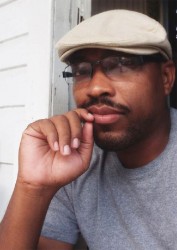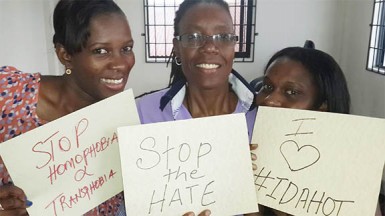– sees heartening response to selfie pitch
SASOD yesterday launched its Cine Campaign, which it hopes will erode phobias towards the LGBT community, thereby curtailing the stigma attached to such persons and encouraging them to seek critical services, particularly health, they usually shy away from out of fear.
The launch was hosted by the Society Against Sexual Orientation Discrimination (SASOD) at Moray House on Camp Street yesterday, and was planned to coincide with International Day Against Homophobia and Transphobia (IDAHOT), which is observed on May 17 annually.
The Cine Campaign will seek to combine social media with film technology in its endeavours. The intent is to mobilise support for the Lesbian Gay Bisexual Transgendered (LGBT) community by encouraging persons who belong to the community, and those who are not part of the community but are interested in lending their hand towards the fight for equal rights of LGBTs.

SASOD’s Advocacy and Communications Officer Schemel Patrick told the gathering at the launch that SASOD has already produced five documentaries which it plans to share later in the year. The documentaries capture the difficulties experienced by members of the LGBT community in various aspects of their lives.
In one of the documentaries, a transgendered woman shared her experiences of being attacked while at a popular “hotspot” after refusing a man’s advances. She said several men attacked her, one of whom used a broken bottle to gash her face and stab her in the back. The woman recounted lying on the ground bleeding out, as the police who were called to the scene stopped briefly before driving away without intervening.
She lived, but require surgery to remove her left salivary gland which was permanently damaged in the attack. She subsequently left the country as she no longer saw it as safe. Today, she continued, she no longer dresses in female garb in all settings; only when she is required to give support to others like herself. Meanwhile, her attacker remains a free man, still frequenting the spot where he attacked her.

Patrick said SASOD is looking to have the documentaries televised by the end of May or in June. She said the non-governmental organisation (NGO) will seek to have the documentaries aired to the far reaches of Guyana so the widest cross section of Guyanese are impacted. She also said that the documentaries will be posted on SASOD’s campaign blog (http://sasodcinecampaign.wordpress.com) after they are aired.
SASOD has also asked supporters to post selfies with notes decrying the discrimination meted out to Guyana’s LGBTs on its Facebook page(https://www.facebook.com/sasod.guyana.5?fref=ts). According to Patrick, the initiative has already attracted over 100 photos from supporters here in Guyana and overseas.
The supporters, she said, consisted of members of the LGBT community, and those not part of the community but who are willing to publicly stand up against discrimination towards LGBTs.
Aside from SASOD’s team and members of the LGBT community in Guyana, the launch was attended by Director of the Pan-Caribbean Partnership against HIV and AIDS (Pancap) Coordinating Unit Dereck Springer.
Springer said that IDAHOT “was set aside to draw the attention of policymakers, opinion leaders, social movements, the media, and the public in general to the issues of violence and discrimination affecting [LGBT] people, and to promote a world of tolerance, respect and freedom regardless of people’s sexual orientation or gender identities.”
He said that efforts such as the ones being undertaken by SASOD are crucial, particularly in the light of the Caribbean’s HIV/AIDs statistics. According to UNAIDS research, while the prevalence of HIV in the region declined from 1.3% to 1% from 2001 to 2012, “the HIV epidemic continues to significantly impact some key populations including Men Who Have Sex with Men (MSM), sex workers, youth and people who use drugs.”
He said that a Lancet study done in 2012 estimated that MSM prevalence in the Caribbean, at 25.4 per cent, is the highest the world over.
He said that much progress has been made towards ridding the Caribbean of AIDS, but lamented that further gains are restricted by the laws many states still hold on to. “Eleven Caricom states have laws which criminalise consensual sex between adults,” he pointed out. Springer said research has shown that these laws have fostered stigma and discriminatory practices in various sectors in these countries, including and particularly the health sector.
Even the Global Commission on HIV and the Law, he said, has found that “countries that criminalise same-sex sexual activity have higher HIV prevalence rates among the MSM than countries which do not.” He continued that in the Caribbean, “stigma is cited as the main reason for the lack of attention to marginalized groups in the prevention efforts, and their general lack of access to HIV-related services.”
The Cine Campaign is being funded by the Caribbean Vulnerable Communities Coalition/ Centre of Integral Orientation and Investigation (COIN), Pancap/ Caricom Global Fund Round 9 “Vulnerabilised Groups” Project. SASOD and three other NGOs received US$20,000 under the fund to execute projects all aimed at strengthening the rights of populations most vulnerable to HIV.
Guyana, like several of its sister Caricom counties, is characterised by high levels of discrimination towards the LGBT community. It is argued that such treatment is proliferated by laws which criminalise LGBT practices, specifically cross-dressing and consensual same-sex intercourse. SASOD has been at the helm of the lobby against such laws in Guyana. A case brought by the NGO on behalf of several transgendered women resulted a ruling by Acting Chief Justice Ian Chang that cross dressing in a public space is not illegal unless it is for an improper purpose.
SASOD Managing Director Joel Simpson said yesterday that while Justice Chang’s ruling embodied advances, it was not enough. The ruling, he said, was vague, as it did not specify what constituted an “improper purpose.” The term is thus left open to free interpretation of the public.
SASOD is seeking, via an appeal, to get a clearer ruling which will ultimately offer transgendered Guyanese added legal protection.




